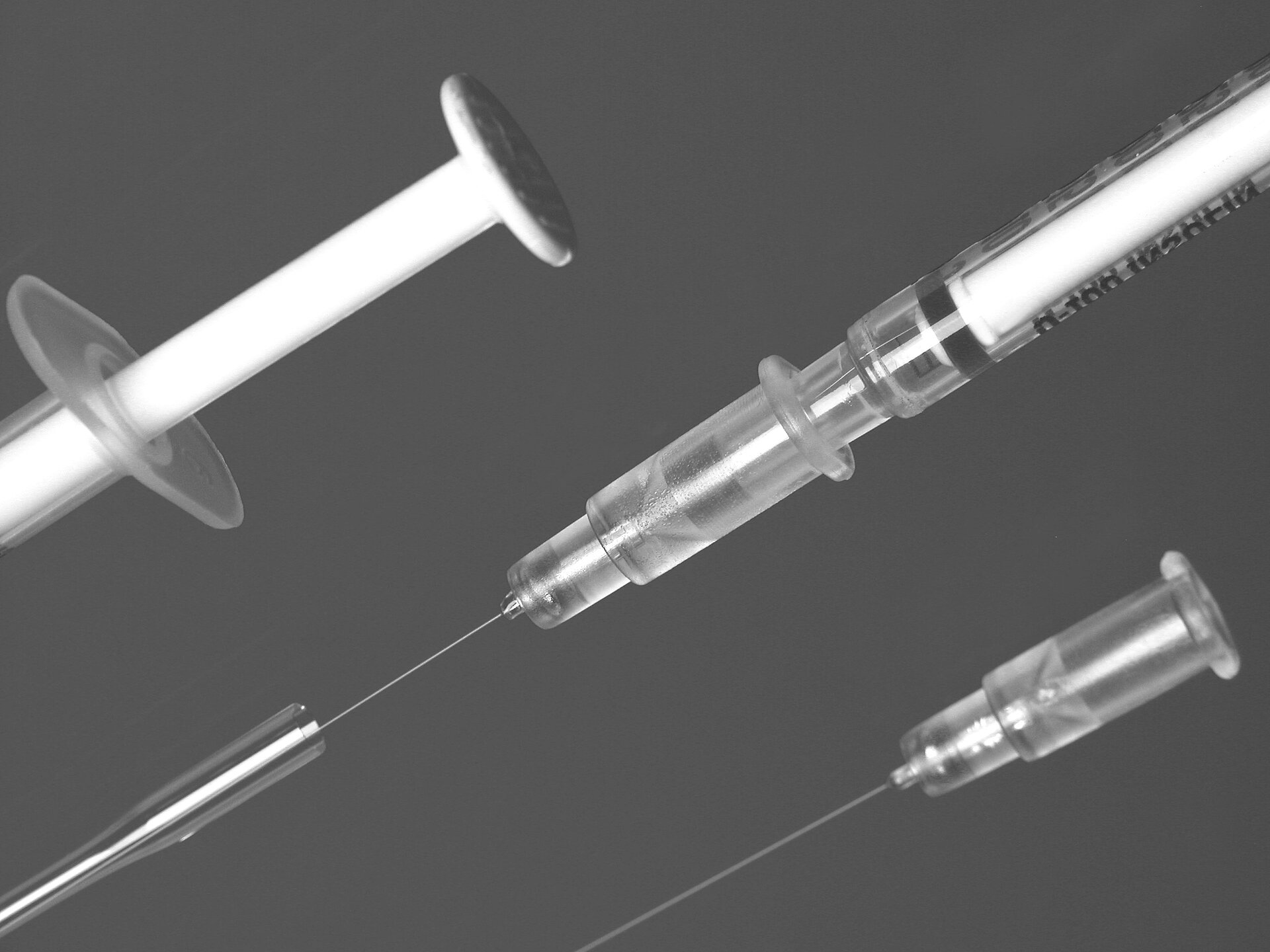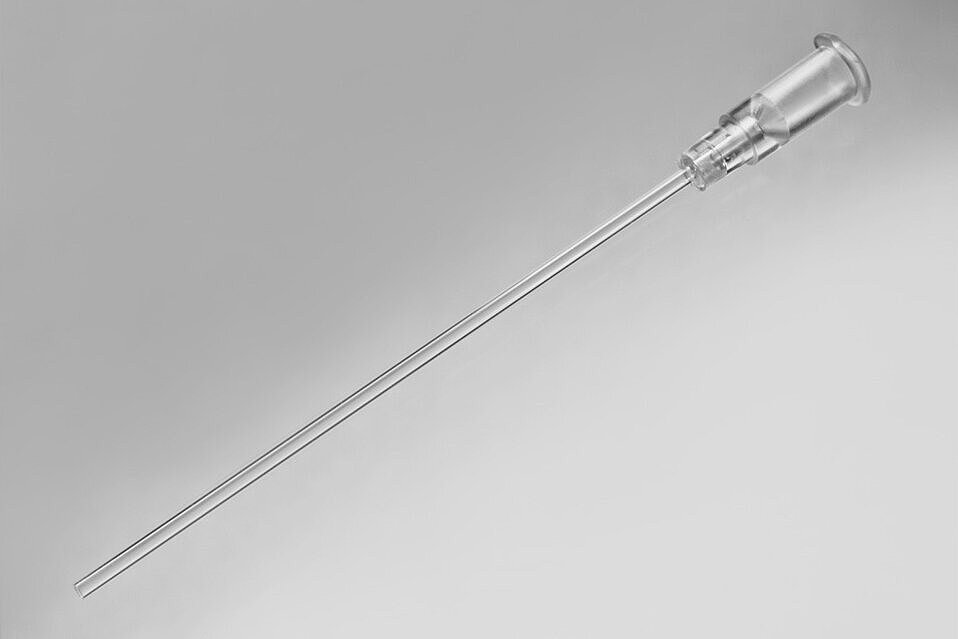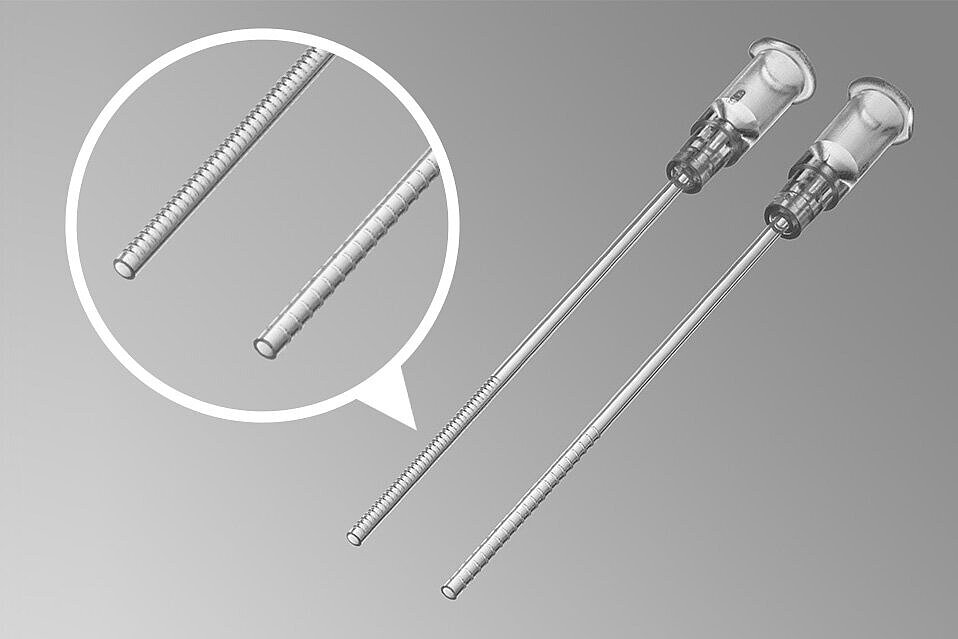
Filling needles
Filling needles – flexible & inflexible
Just like the standard steel needles used in the field of medicine, we produce special needles where we have replaced the metal cannulas with a glass capillary. Glass capillaries offer many decisive advantages over metal cannulas in a number of applications:
- Completely smooth surface, both inside and outside
- High flexibility of cannulas smaller than 500 µm
- Diameters from less than 200 µm to max. 70 µm possible
- Inert material, chemically resistant, even at high temperatures
- Transparent, for observations in the cannula
- Extremely precise measurements, both inside and outside
- Glass reservoirs can be integrated into the needle
- Wide variety of configurations, applications and customer-specific solutions possible
The only disadvantage to glass needles compared to their metal counterparts is their lower mechanical stability.
- Capillaries are mounted directly in the connector
- Capillaries are covered with a sheath capillary in order to improve their stability, however this causes the very fine capillary to poke out from the cladding tube at the end
- Capillaries can also be angled
View the needles we currently have in stock here
Filling the very small NMR tubes of the Bruker Match™ system presents a particular challenge. We have developed two different dispensing needles specifically for this task, in order to radically simplify the filling process. While one needle can be used just like a glass needle and in combination with a disposable syringe, a syringe piston has been integrated into the other needle. Both needles, just like our NMR tubes, are made with borosilicate glass 3.3. We also offer a small disposable syringe with a volume of just 0.5 ml for the dispensing needles with syringe connector.
- With flexible, thin tip
- Minimum purchase: 100 units
| Article number | Description | Inquiries |
|---|---|---|
| 4010313 | "NMR micropipette, with reservoir and Luer connector (requires disposable syringe)" |
|
| 4010339 | "NMR micropipette, with reservoir and integrated plastic piston" |
|
We have developed special glass needles for filling our Mark tubes with liquid samples. The thinnest needle has a diameter of less than 0.1 mm. This means that even the finest of Mark tubes can be filled without a problem.
The needle can be attached to a standard disposable syringe or microliter syringe using a standard Luer connector. We use borosilicate glass to make the filling needles. The shaft is made from a plastic into which the needle is glued. Various diameters are available.

- Made from borosilicate glass 3.3
- With Luer connector
- Minimum purchase: 20 units
| Article number | Suitable for Mark tubes | Inner Ø (mm) | Length (mm) | Inquiries |
|---|---|---|---|---|
| 4018103 | >= 0.6 mm | ~ 0.4 | ~ 70.00 |
|
| 4018104 | >= 0.3 mm | ~ 0.2 | ~ 70.00 |
|
| 4018105 | >= 0.6 mm | ~ 0.4 | ~ 100.00 |
|
| 4018106 | >= 0.3 mm | ~ 0.2 | ~ 100.00 |
|
| 4018107 | >= 0.2 mm | ~ 0.08 | ~ 100.00 |
|
| 4018108 | >= 0.1 mm | ~ 0.05 | ~ 100.00 |
|
SPECIAL
We have already manufactured special customer-specific solutions for this product group. Further examples of special products can be found under the respective product category or under Special Solutions.
Flexible and thin needles
The very thin and flexible glass fiber needle is highly resistant to most solvents, acids and alkalis. The flexibility of the needle is achieved by the small outer diameter, as the needles can be bent from as little as 0.7 mm. We can produce needles with a diameter of less than 100 µm. The end of the fiber is embedded in a Luer connection made of Makrolon, allowing the use of commercially available syringes and pump systems.
Glass needles with curved tip
Whether for lifting and holding components or for dispensing the smallest volumes in the narrowest of spaces, our small glass needles with angled tips are ideal. The angled tips can also be used for a simplified assembly or better ergonomics when handled manually. They are also inert and transparent, which facilitates the monitoring of samples and parts in the needle.
Very flexible polyimide-coated filling needles
Our glass needles boast high flexibility. This is achieved by applying an external coating, for example. The needles can be bent up to 360° and then return to their original alignment without any problem. The capillaries are also protected by the coating. Should they break despite their extraordinary flexibility, the coating holds together slivers and broken parts. These capillaries, including their coating, are highly inert and the coating is dissolved by only very few solvents. The needles are suitable for filling micropipettes and for dispensing the smallest volumes, even in inaccessible positions.







